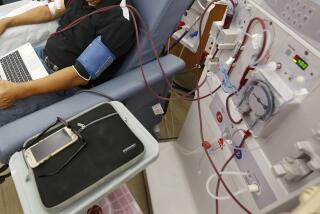Therapy to Block Kidney Rejection OKd; Researcher’s Son Will Benefit
- Share via
WASHINGTON — Kidney transplant patients gained a new weapon Thursday to improve the chances that their donated organs will survive--an especially poignant advance for the doctor who pushed it through rigorous testing. Her toddler son will one day receive one of her kidneys, along with the genetically engineered therapy she helped produce.
The Food and Drug Administration on Thursday approved a monoclonal antibody that blocks immune cells from attacking the new kidney during the first eight weeks after transplant, the riskiest period.
The antibody, Zenapax, is administered with standard anti-rejection drugs, but its highly specific target means it causes no additional side effects, the FDA said. For the first time, doctors can strengthen organ protection without additional risk.
In a six-month study of 260 patients, 35% on standard anti-rejection treatment showed signs of kidney rejection, compared with just 22% of patients who took Zenapax, known chemically as daclizumab, added to the standard mix.
“It helped me cope by knowing . . . I could do something that has potential not just for Jake, but I have a kinship for all the other kids who have this disease,” said Dr. Susan Light, Hoffman-La Roche’s lead researcher for Zenapax.
Her son Jake Margolis has a type of polycystic kidney disease, a genetic disorder that destroys the kidneys during childhood. So far, Jake is doing well, but eventually he will receive a kidney from his mother.
Zenapax ultimately may help more than just kidney patients because the immune system cells it blocks can attack any transplanted organ, explained Dr. Ezio Bonvini, head of the FDA’s immunobiology lab. “We don’t have the data at the moment, but this is very likely to” work on other transplants.
Roche is preparing to test liver transplant patients and then heart transplant patients.






